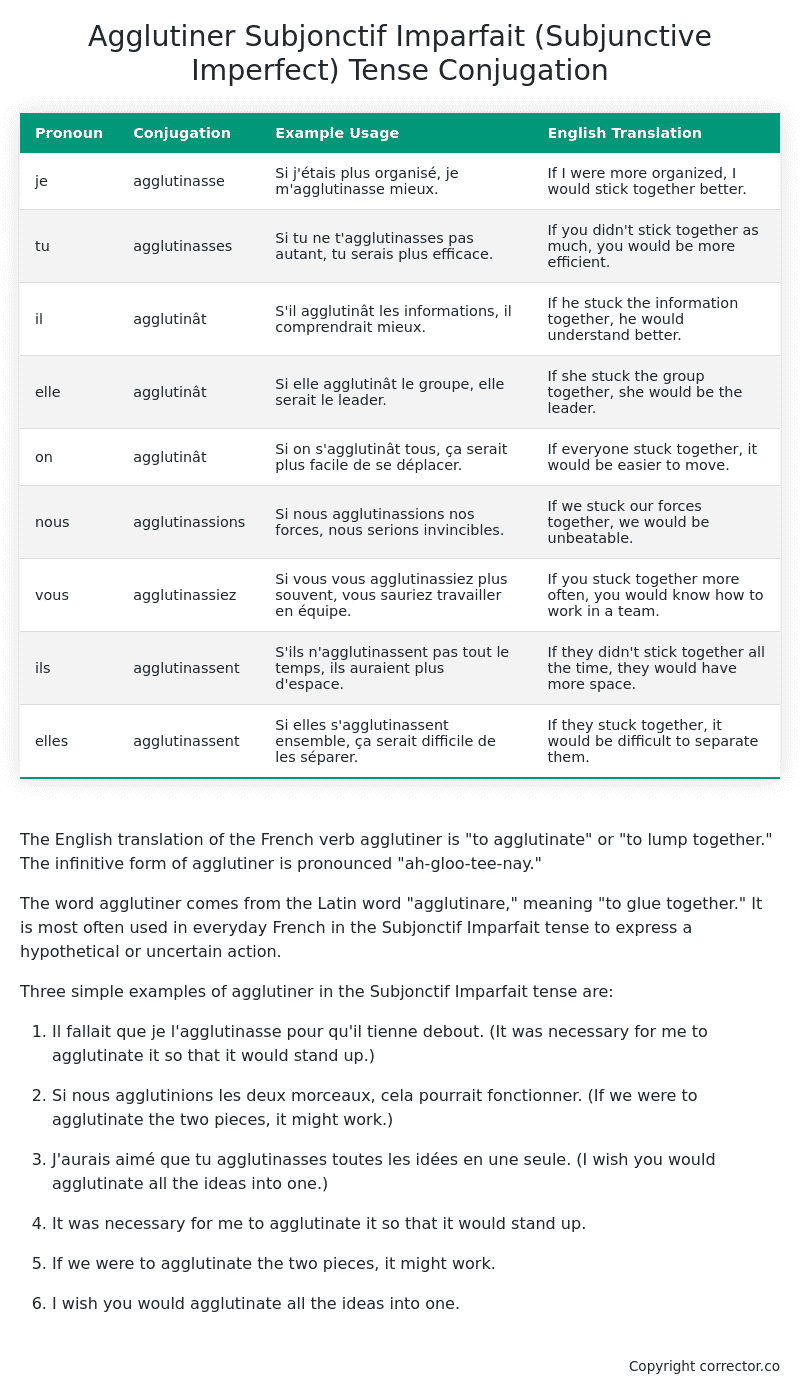Subjonctif Imparfait (Subjunctive Imperfect) Tense Conjugation of the French Verb agglutiner
Introduction to the verb agglutiner
The English translation of the French verb agglutiner is “to agglutinate” or “to lump together.” The infinitive form of agglutiner is pronounced “ah-gloo-tee-nay.”
The word agglutiner comes from the Latin word “agglutinare,” meaning “to glue together.” It is most often used in everyday French in the Subjonctif Imparfait tense to express a hypothetical or uncertain action.
Three simple examples of agglutiner in the Subjonctif Imparfait tense are:
-
Il fallait que je l’agglutinasse pour qu’il tienne debout. (It was necessary for me to agglutinate it so that it would stand up.)
-
Si nous agglutinions les deux morceaux, cela pourrait fonctionner. (If we were to agglutinate the two pieces, it might work.)
-
J’aurais aimé que tu agglutinasses toutes les idées en une seule. (I wish you would agglutinate all the ideas into one.)
-
It was necessary for me to agglutinate it so that it would stand up.
-
If we were to agglutinate the two pieces, it might work.
-
I wish you would agglutinate all the ideas into one.
Table of the Subjonctif Imparfait (Subjunctive Imperfect) Tense Conjugation of agglutiner
| Pronoun | Conjugation | Example Usage | English Translation |
|---|---|---|---|
| je | agglutinasse | Si j’étais plus organisé, je m’agglutinasse mieux. | If I were more organized, I would stick together better. |
| tu | agglutinasses | Si tu ne t’agglutinasses pas autant, tu serais plus efficace. | If you didn’t stick together as much, you would be more efficient. |
| il | agglutinât | S’il agglutinât les informations, il comprendrait mieux. | If he stuck the information together, he would understand better. |
| elle | agglutinât | Si elle agglutinât le groupe, elle serait le leader. | If she stuck the group together, she would be the leader. |
| on | agglutinât | Si on s’agglutinât tous, ça serait plus facile de se déplacer. | If everyone stuck together, it would be easier to move. |
| nous | agglutinassions | Si nous agglutinassions nos forces, nous serions invincibles. | If we stuck our forces together, we would be unbeatable. |
| vous | agglutinassiez | Si vous vous agglutinassiez plus souvent, vous sauriez travailler en équipe. | If you stuck together more often, you would know how to work in a team. |
| ils | agglutinassent | S’ils n’agglutinassent pas tout le temps, ils auraient plus d’espace. | If they didn’t stick together all the time, they would have more space. |
| elles | agglutinassent | Si elles s’agglutinassent ensemble, ça serait difficile de les séparer. | If they stuck together, it would be difficult to separate them. |
Other Conjugations for Agglutiner.
Le Present (Present Tense) Conjugation of the French Verb agglutiner
Imparfait (Imperfect) Tense Conjugation of the French Verb agglutiner
Passé Simple (Simple Past) Tense Conjugation of the French Verb agglutiner
Passé Composé (Present Perfect) Tense Conjugation of the French Verb agglutiner
Futur Simple (Simple Future) Tense Conjugation of the French Verb agglutiner
Futur Proche (Near Future) Tense Conjugation of the French Verb agglutiner
Plus-que-parfait (Pluperfect) Tense Conjugation of the French Verb agglutiner
Passé Antérieur (Past Anterior) Tense Conjugation of the French Verb agglutiner
Futur Antérieur (Future Anterior) Tense Conjugation of the French Verb agglutiner
Subjonctif Présent (Subjunctive Present) Tense Conjugation of the French Verb agglutiner
Subjonctif Passé (Subjunctive Past) Tense Conjugation of the French Verb agglutiner
Subjonctif Imparfait (Subjunctive Imperfect) Tense Conjugation of the French Verb agglutiner (this article)
Subjonctif Plus-que-parfait (Subjunctive Pluperfect) Tense Conjugation of the French Verb agglutiner
Conditionnel Présent (Conditional Present) Tense Conjugation of the French Verb agglutiner
Conditionnel Passé (Conditional Past) Tense Conjugation of the French Verb agglutiner
L’impératif Présent (Imperative Present) Tense Conjugation of the French Verb agglutiner
L’infinitif Présent (Infinitive Present) Tense Conjugation of the French Verb agglutiner
Struggling with French verbs or the language in general? Why not use our free French Grammar Checker – no registration required!
Get a FREE Download Study Sheet of this Conjugation 🔥
Simply right click the image below, click “save image” and get your free reference for the agglutiner Subjonctif Imparfait tense conjugation!

Agglutiner – About the French Subjonctif Imparfait (Subjunctive Imperfect) Tense
Formation
Common Everyday Usage Patterns
Interactions with Other Tenses
Subjonctif Présent
Indicatif Passé Composé
Conditional
Conditional Perfect
Summary
I hope you enjoyed this article on the verb agglutiner. Still in a learning mood? Check out another TOTALLY random French verb conjugation!


